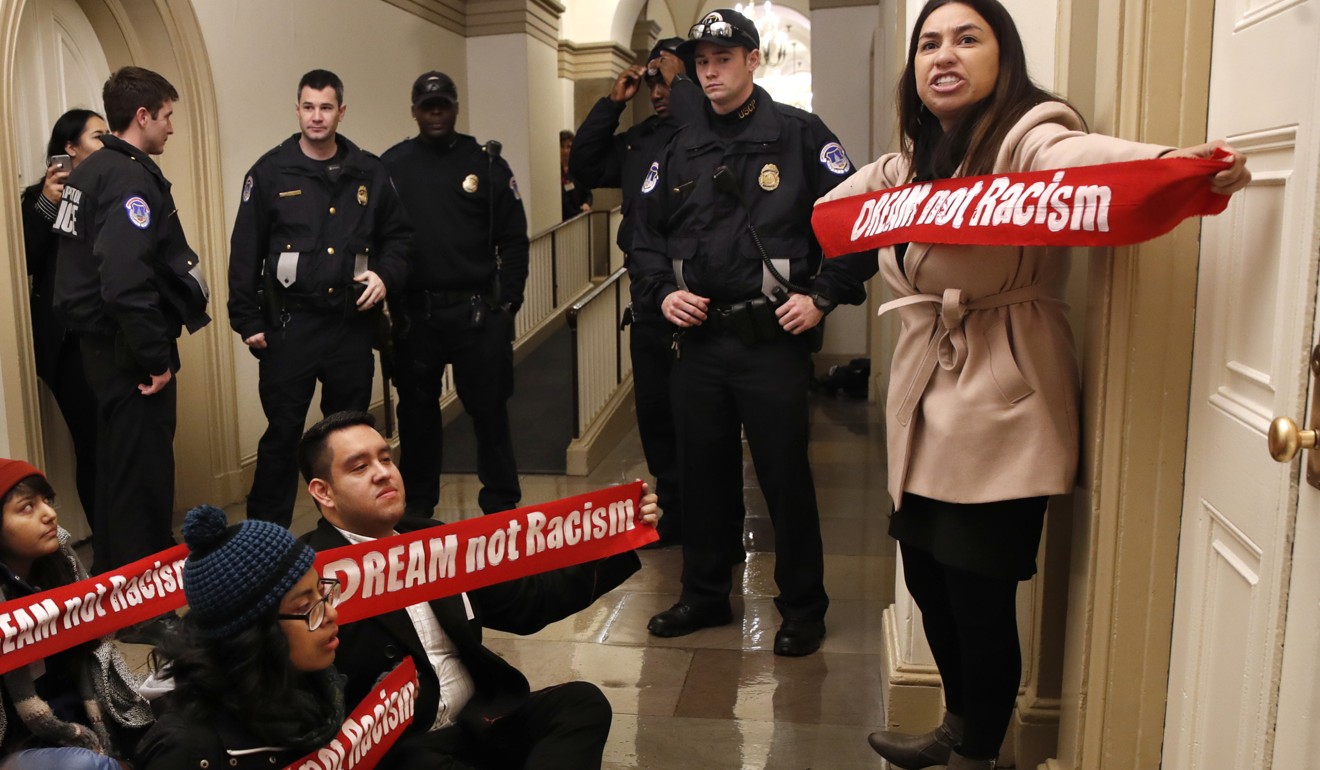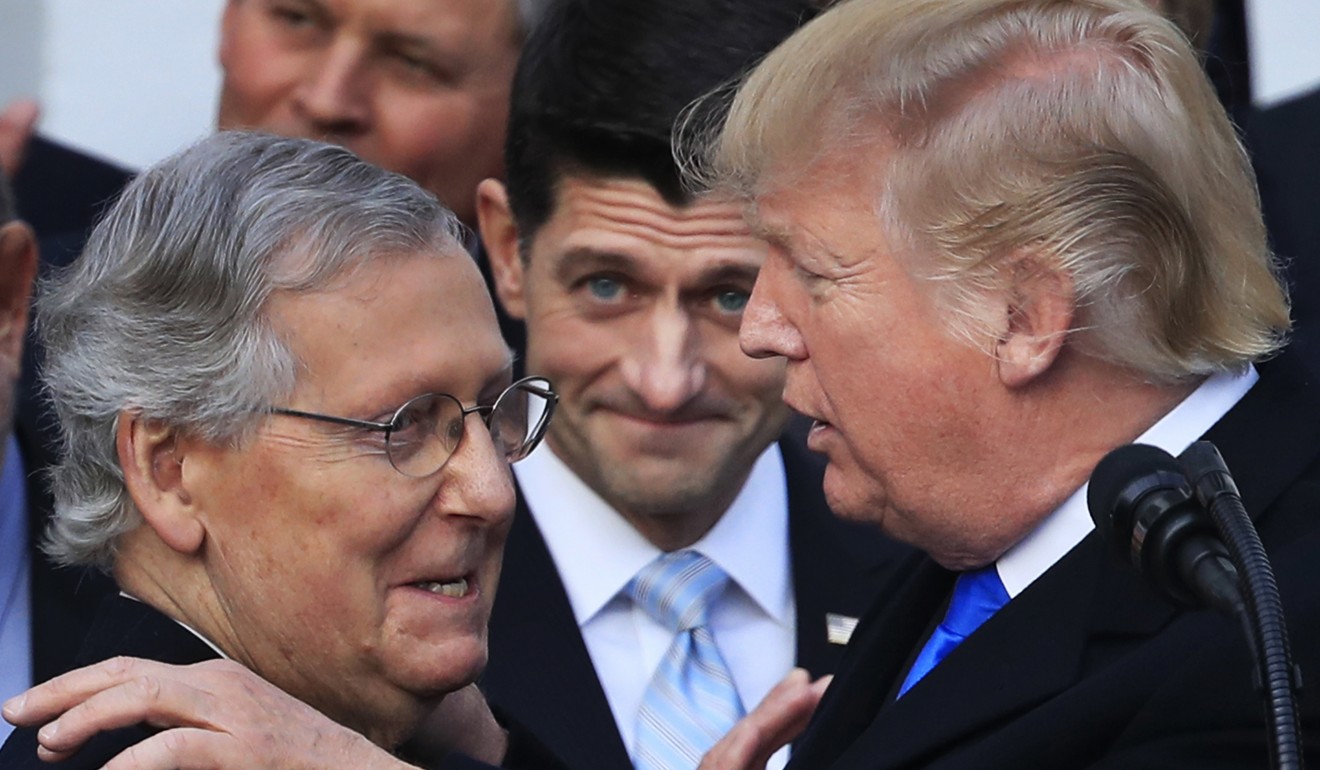
Update | House Republicans pass spending plan to avert US shutdown, brushing off Trump complaints. Now it’s up to Senate
Prospects for the bill, which was criticised by Trump, are uncertain in the Senate
US House Republicans pushed through a stopgap spending bill Thursday evening, brushing off President Donald Trump’s last-minute ambiguity about the deal and setting up what is likely to be a nail-biting Senate vote Friday to avert a government shutdown.
After teetering most of the day, the four-week spending measure won a pivotal endorsement from conservative lawmakers in the House Freedom Caucus, providing the votes needed amid strong Democratic opposition.
The debate next moves to the Senate, where the bill’s prospects are uncertain.
Conservative Republicans and defence hawks object to yet another temporary measure and want more stable funding. Democrats are rejecting the package without an immigration deal to protect so-called Dreamers from deportation.
Fearing a possible shutdown, Republicans and Democrats were already angling to blame each other if federal offices are shuttered for the first time since 2013, when Republicans closed the government in an unsuccessful bid to kill Obamacare.
The current spending authority for government operations ends after midnight Friday. If not extended, hundreds of thousands of federal workers would be furloughed and many – but not all – government offices would be shut down.
GOP leaders had been racing to cobble together what would be their fourth short-term funding bill since last fall.
The proposed extension to February 16 includes six years of additional funding authorisation for the Children’s Health Insurance Program for working-class kids, a provision added to help attract Democratic votes.
But most Democrats panned the measure. House Minority Leader Nancy Pelosi of California called the GOP bill a “bowl of doggy doo.”

Democrats are angry that the GOP bill lacks protections for Dreamers, young immigrants brought to the country illegally by their parents. Trump has said he will end the Obama-era Deferred Action for Childhood Arrivals programme, which offered the immigrants protection from deportation and work permits.
Although Trump has said he wants to help Dreamers, he is also trying to get funding for his border wall with Mexico along with other immigration law changes in return. Talks on immigration continued Thursday behind closed doors.
Trump and GOP leaders in Congress have worked hard to blame Democrats for any potential shutdown, but Pelosi said Republicans bear responsibility because they control the government.
“This is one of the only times ever there’s been a shutdown when one party controlled the House, the Senate, the White House,” she said, noting that Trump has previously said a shutdown might not be a bad thing. “It’s really almost like an amateur hour.”
Even some Republicans are unconvinced about the GOP plan, either because it does not include increased funding for the Pentagon or because they want to reduce government spending on principle. Others also want help for Dreamers or additional disaster aid for victims of the recent hurricanes and fires.
Republicans, with their slim 51-seat majority in the Senate, is likely to need about a dozen Democrats to reach the 60 votes needed to overcome a filibuster, assuming some GOP senators object or miss the vote as expected.
Trump didn’t help matters early Thursday when he suddenly tweeted against including the extension of the children’s insurance programme. In a tweet, Trump said funding for the programme should be part of “a long-term solution,” not the stopgap measure.
Some speculated that perhaps the president was not aware that the CHIP funding would be extended for six years, rather than the four weeks of the spending bill. The president had similarly undermined a House vote last week reauthorising a federal surveillance programme until House Speaker Paul D. Ryan, R-Wis., intervened and Trump reversed course.
By lunchtime, the administration tried to clarify the confusion, insisting that the president supports the current measure in the House. That was only after Ryan again spoke to the president by phone and the GOP whip, Sen. John Cornyn of Texas, tweeted a rebuttal.

“I’ve spoken with the president,” Ryan told reporters. “He does understand.”
In the final hour of negotiations before the House vote, Ryan met with the chairman of the Freedom Caucus, Rep. Mark Meadows, R-N. C. Most of the group’s members agreed to back the spending bill in exchange for future votes – including on a “conservative” immigration bill that would likely include even tougher border security and other provisions, aides said. They also won a promise for an eventual House vote on increased military spending.
In remarks at the Pentagon Thursday morning, Trump seemed resigned to a federal shutdown.
“It could happen,” he said. “We’ll see what happens. It’s up to the Democrats.” Later in the day, as negotiations continued, Trump left Washington to attend a rally in Pennsylvania to offer his support for a Republican congressional candidate.
Trump and other Republicans stressed the negative effect a shutdown would have on the US military.
But prospects in the Senate dimmed as leading Democrats – including some who supported the last stopgap measure – said they would withhold support without a resolution for Dreamers.
The top Democrat on the Appropriations Committee, Sen. Patrick Leahy of Vermont, said he would vote against the bill, as did the Virginia Democrats, Sen. Tim Kaine and Sen. Mark Warner, who represent large numbers of federal employees, and the New Mexico Democrats, Sens. Martin Heinrich and Tom Udall, who represent large numbers of immigrants and their advocates.
Senate Democrats are under great pressure from Dreamers to use their leverage to stop the bill and get an immigration deal.
Several GOP senators have also said they won’t vote for the short-term measure, including Sens. Lindsey Graham of South Carolina and Rand Paul of Kentucky. Other Republicans are on the fence, and Sen. John McCain of Arizona has not returned to Washington since going home to battle brain cancer.

